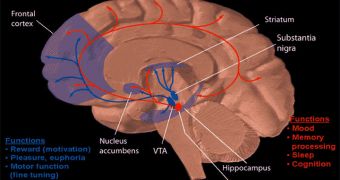One of the most severe consequences of anorexia is the loss of a certain volume of gray matter in the brains of patients suffering from this debilitating condition. This adds to other physical and mental effects, such as unhealthy body weight, low amounts of energy, depression and others. But a new study would appear to suggest that lost brain matter can easily be recovered through therapy, if people suffering from anorexia nervosa (the scientific name for the condition) revert to a healthy life style, and get enough to eat. The key issue here is to address the malnourished body, LiveScience reports.
Most anorexic people tend to starve themselves in order to lose weight, because they feel they are too fat. However, they continue to do so even after they reach their optimal weight, until they become malnourished. Their lives are also at risk, doctors say, and that's why devising methods of identifying sufferers, and developing treatments, is so important. Other anorexics simply eat as much as they want, but they then shove their fingers down their throats, and purge their stomach. This habit wreaks havoc in their stomachs and livers, which work for nothing, and produce chemicals that throw the body off-balance, doctors say.
“Anorexia nervosa wreaks havoc on many different parts of the body, including the brain,” Yale University study team leader Christina Roberto says. She adds that her team became interested in the effects of anorexia on brain matter after previous studies discovered little differences between the brains of former anorexics and those of healthy peers. So the researchers set out to find out how fast gray matter recovers, and to what extent. They tested 32 female anorexia patients against a control group of 21 healthy females, using an investigation method known as magnetic resonance imaging (MRI). The test group was further divided into two groups – depending on which of the two methods they used to remain thin.
“Within a few weeks a little over a month we started to see that reversal. Their gray matter didn't fully normalize, but another study suggests if a patient maintains that weight over time it probably will fully normalize,” the team says. “We hypothesize that it's linked to starvation and being in an underweight state. If you starve yourself, that nutrition deficit leads to reduced brain volume,” Roberto adds. Additional details of the investigation appear in the May issue of the International Journal of Eating Disorders.

 14 DAY TRIAL //
14 DAY TRIAL //